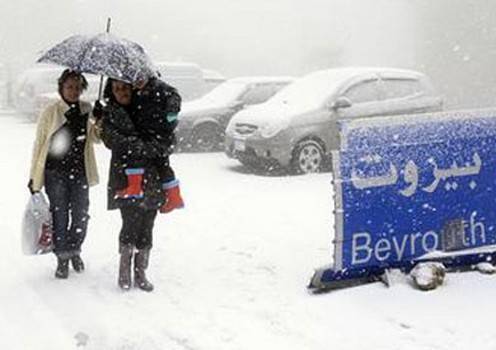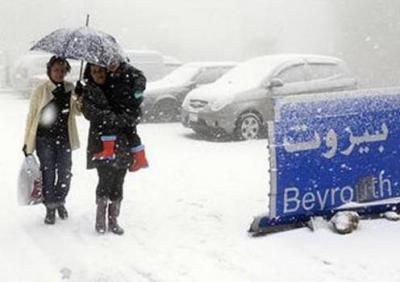Year after year, winter grows harsher for Lebanon, and its white snow is draped in the black veil of suffering. The season of goodness that the "land of cedars" used to wait for, to bring cold and peace, has turned into... a nightmare. How do the Lebanese cope with their frigid winter now that the cost of heating has become "excruciating," and they have lost what they used to save for rainy days? How do they secure their food and medicine in remote areas where municipalities are unable to clear snow-covered roads? Is the winter tourism season enough to help them overcome these difficulties, or is the crisis more severe and harsher than a short, resource-limited tourism season?
Giant European economies are facing heating crises and difficulties in providing warmth for all their residents as winter arrives. Advanced social protection systems find themselves unable to assist the most vulnerable who are least capable of enduring the cold and snow. So how can a nation that is collapsing, with all its state components eroded and its treasury depleted to the last penny, face the ferocity of winter that is knocking at its doors? The answer touches on the limits of the dilemma, and local officials, mayors, humanitarian organizations, and citizens raise their voices high.
#### Facing Winter with... Flesh and Blood
Milad Al-Alam, the Mayor of the town of Rmeich (southern Lebanon), which is about 800 meters above sea level, tells "Al-Rai" that "the reality is very difficult, and people are suffering to secure heating after the price of a ton of diesel reached $1200, which is an astronomical figure that citizens find hard to afford. Consequently, some individuals from inside and outside the village have committed atrocities against the environment and the forests surrounding the village, devastating timber resources under the pretext of obtaining firewood for heating, and no one has been able to stop them. We contacted security forces and the ministries of agriculture and environment, even the judiciary, but we couldn’t stop the massacre. Trees that are hundreds of years old have been destroyed, and a ton of firewood is sold for 4 million Lebanese pounds, less than one hundred dollars, while the fine is less than a dollar!"
Al-Alam confirms that there are indeed families unable to secure heating, clarifying that the municipality "is striving in cooperation with some humanitarian organizations to assist the poorest among them, numbering 500 households." But how can municipalities with empty coffers provide assistance? He responds: "This year is worse than previous ones, especially since people have spent their savings and no longer have anything to help them. When have we heard in Lebanon that people sell their jewelry to educate their children and provide them heating? No one sheds light on peripheral areas. The village is vast, and we cannot meet the majority of the needs of its residents, and on top of that, we have more than a thousand Syrian refugees... Roads may flood, and water will enter homes, and we are unable to solve winter problems."
#### Living Day by Day
In another mountainous area in the heart of Mount Lebanon lies the village of Btehloun, where its humble municipality is trying to help its residents face the harsh winter. Mayor Marwan Qais states: "The capability for diesel heating for those without anyone abroad is nonexistent. We have tried, in cooperation with the Chouf Cedar Reserve, to thin the forests surrounding the area in hopes of providing firewood for families for heating without harming the environment. Several residents of the village are unable to secure heating, so we appeal to expatriates to adopt families back home. But there remain families with no one to assist them, including widows, the elderly, and neglected ones."
However, heating is not the only challenge for facing winter; the cold season is accompanied by illnesses that require medical treatment or care. This is another issue, says Qais: "We have cooperated with 12 neighboring villages to establish the Jraakoub and Harf Villages Development Association, and we have managed to provide the necessary medical supplies for clinics in the area thanks to cooperation with international bodies and humanitarian organizations. We also send medical prescriptions to our people scattered abroad in hopes they can secure medications that often arrive late. In this way, we strive to meet the needs of the poorest, without claiming that we can fully cover their needs."
The elderly, the disabled, and children are all at risk in winter from waves of infections, especially with the absence of appropriate heating, and they require medical care that has become difficult to provide amid the general shortage of medical staff in remote hospitals, who seek livelihoods elsewhere. With people's inability to bear the burdens of treatment in the absence of contributions from guaranteed parties, and the difficulty of private hospitals maintaining low costs when the prices of all medical supplies and services have skyrocketed, the problem is compounded—no heating, no medical care, but persistent deficiencies in facing a harsh winter.
"We live day by day," confirms Qais, "with the least possible resources to secure what our villages need. We appeal to the benevolent and handle issues case by case. But every day is worse than the last. If we could provide assistance last year, matters are still unclear this year, and there is no doubt that the health, food, and social security for people are at risk despite our efforts."
#### A Cry of Despair and Anger
In a remote Bekaa town, the mayor refuses to officially talk about the calamities he faces. In a cry of pain, he asks, "Where do I start? From securing diesel for the only snowplow in the village to open roads after heavy snowfall, and what is left of our municipality? Or the difficulty of accessing remote homes to respond to emergency calls after snow overwhelms narrow roads, and we can’t secure resources to clear them? Or from the village's public school abandoned by its students due to the ongoing strike of its teachers and the failure to provide heating for the students? Or from dark roads that offer no glimmer of light, day or night, due to the power outage, turning them into traps for cars and anyone daring to venture out? The state has completely abandoned us, leaving us to face our fate in winter, as if we were not within its borders. Whoever gets sick in our village dies at home before reaching a hospital. And you ask how we endure winter?"
This cry echoes in many villages, as suffering is shared though its levels vary from one area to another. In Akkar, Thuraya Hamoud, project manager for "Rescue Lebanon," a developmental project aimed at supporting the Akkar region and meeting some of its needs in cooperation with the Swedish municipalities federation, states that the situation of people in winter is nearing catastrophe. "Residents were forced last year to use whatever they could find for heating, from plastic to wood or paper and nylon bags; they even resorted to burning wooden furniture in their homes for warmth. They broke cupboards and burned them… Fires that occurred in the forests were sometimes intentionally set to obtain wood, and violations against forests are undeniable. But people are in a survivor situation; can we blame them for their attacks on trees?"
#### A Battle of Empty Pockets
The prevailing sentiment is that this year is worse than previous ones, and those who had saved some money are now at zero, increasing the hardship for a larger number of families. "No one is capable of providing help," says Hamoud, "neither municipalities nor humanitarian organizations, because the needs are many while the resources are scarce. This winter, there are serious concerns about municipalities’ ability to clear the snow, so we are preparing the emergency response team we previously trained to be ready to assist individuals stuck in their homes under the snow. Municipalities may be able to open main roads and clear snow from them, but small secondary roads are sure to suffer, and so do the residents living on their edges. We are doing what we can to secure a vehicle capable of opening small roads to assist people in reaching clinics and hospitals. But here the problem expands and grows because people can no longer afford the necessary medical care for many reasons, not least of which is the cost of healthcare and transportation to hospitals, coupled with the departure of medical staff from hospitals in these regions."
Amid the bleak picture, we ask about the Lebanese provisions that used to accompany mountain dwellers during their long winters: Are they still a source of sustenance in difficult days? "Whoever could secure adequate provisions for themselves and their family can no longer ensure the quantities needed to get through winter with the soaring prices of all materials. Most residents of the region are either in the army or in the education sector, and we all know the state of salaries in these two sectors and how much they have lost in value. They are the most affected. There is no doubt they can no longer secure their winter necessities for heating and provisions. But fortunately, people help each other, and everyone who can stands beside their family to provide support for survival."
Despite this tragic reality, winter in Lebanon still retains a white face. A tourism and leisure face that it desperately needs for financial return. Mountainous regions and ski resorts are preparing for a promising winter, and with the arrival of large numbers of tourists and expatriates, these areas are gearing up to benefit from the season, even if costs barely match profits. The Lebanese remain capable of conjuring the miracle of survival with every sunrise or... drop of rain.




